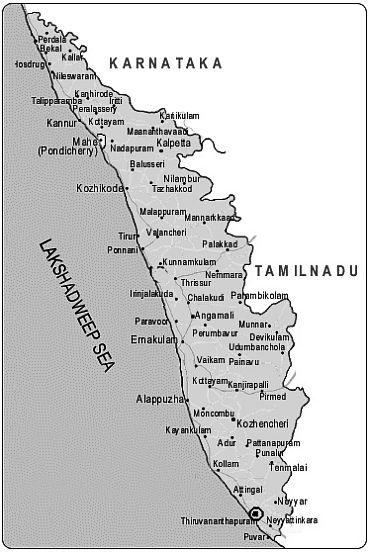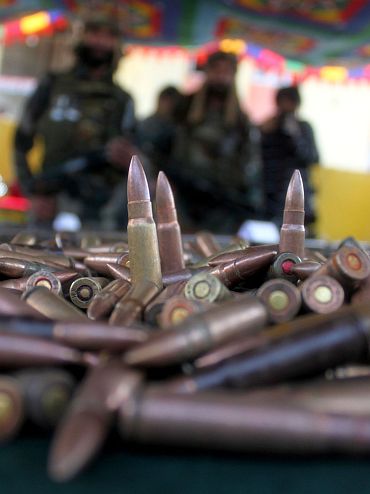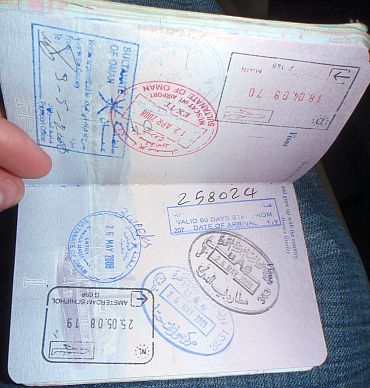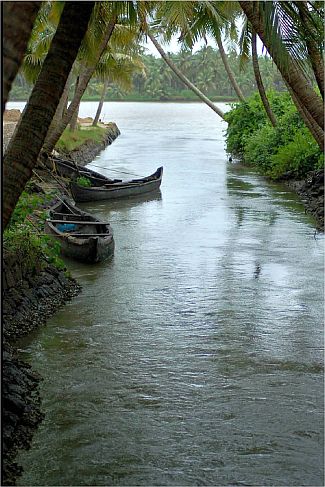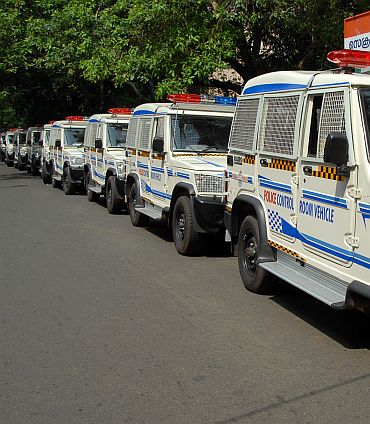 | « Back to article | Print this article |
Kerala: Now terror's own backyard in India
Last updated on: July 1, 2011 12:11 IST
Vicky Nanjappa reports on how Kerala, populary known as God's own country, is now a haven for hawala transactions and the perfect breeding ground for terroristsAccording to the Union home ministry, the annual remittance through hawala channels into Kerala is a whopping Rs 20,000 crore. This figure tells the story of a state, which has today become a hub for extremists.
Every possible national agency probing terrorism-related cases is focused on Kerala and the situation is going from bad to worse.
The factors for such extremism are many -- raging from communally-charged up feelings to the fact that this state is almost a corridor between India and the Gulf.
The hawala remittance into this state is the highest when compared to any other state in India. There is a large population from Kerala that lives in the Gulf and remitting money back home has always been a big worry for these persons.
These individuals then started to adopt to the hawala module, which helped them transfer large sums of money with ease. Now it is a known fact that terrorists have a big role to play in hawala transactions and hence taking advantage of the situation, they began pumping in their money too.
Click on NEXT to read further...
Kerala government knew but did nothing
Last updated on: July 1, 2011 12:11 IST
The Kerala government was in the know of the money being sent in through hawala channels, but what they did not bother to check was that terrorists too were pumping in money using the same channels. Today, they are finding it difficult to clean up.The National Investigating Agency, which has its eyes on this state, has also found that large sums of money, which has been pumped in from the Gulf, had been used to execute the blasts at Delhi, Bengaluru and also at Ahmedabad.
The Indian Intelligence Bureau says that a couple of years back, Kerala was only a corridor to terror in the south. However, today it is without a doubt the main breeding centre for such extremist groups in the country.
Sources say that for the ISI it was easy to set up terror camps in this state. The political will was lacking and elections were far more important compared to national security. Due to politics, smaller groups were allowed to grow and a main fighting plank during the elections became communal rioting. This helped such forces to grow and before anyone realised that they had set up base comfortably.
Kerala cadre for jihad in Kashmir
Last updated on: July 1, 2011 12:11 IST
While it was obvious that the nature of this state was changing gradually, the first big information regarding the reach of the Kerala cadre was known only when a cell phone belonging to a person by the name Umar was traced. Umar, an operative of the Lashkar-e-Tayiba operating in Kashmir, was from Kannur.
Subsequently, more news trickled in and it was found that three more persons from Kerala were killed in an encounter in Kashmir. This raised alarm bells among the security agencies who realised that it was probably for the first time that Indian cadres were used in the battle at Kashmir and ironically they were all picked up from Kerala.
Of the men, Jabbar, who was picked up the police, stated that he thought they were being taken for training in Islam.
I was taken aback when they told me my training would be with arms. In fact, we were told if we did not take up arms then our families would be harmed, he told his interrogators.
It appears as though Gulf modules were formed keeping Kerala in mind
Last updated on: July 1, 2011 12:11 IST
According to IB reports, the ISI has set up strong modules of the Lashkar-e-Tayiba in the Gulf. The Oman module is also very strong and directly connected to the modules in Kerala. When the ISI began setting up Gulf modules, it initially had a lot of youth from Uttar Pradesh. However, gradually the cadres from UP were being replaced with those from Kerala. These youth were in charge of sending across funds and pulling out youth from Kerala and sending them for training again using the Gulf route.
For the ISI, the Gulf module is one of the strongest today and what works against India is that the Gulf and the Kerala are directly connected. It appears as though modules in the Gulf were formed keeping Kerala in mind.
Although the exact number of Lashkar modules in Kerala are not known, sources say that there could be anything between 50 to 100 modules. The number of sleeper cells is almost double this number, they point out.
Cadres undertake a dual job
Last updated on: July 1, 2011 12:11 IST
Most of the cadres in these modules undertake a dual job. During the elections they become party workers and often create the necessary ruckus for politicians. This ensures that they get the immunity which helps them go underground and go about their real job.
In this context it would be pertinent to note the role played by T Nasir, an accused in the Bengaluru blasts case.
Nasir had become the perfect link between the modules in Kerala and the ISI. He was a part of the Students Islamic Movement of India before it was banned. He then moved out of Kerala and worked in Muscat and Dubai before coming in contact with ISI agents.
He was asked to recruit youth back in Kerala for terror operations, which he did on his return to Kerala. The likes of Nazir pick and choose youth with visa or job problems and offer help. While doing so they take them into their fold and convince them to take the extremist route.
Training takes place in secluded areas of Kerala
Last updated on: July 1, 2011 12:11 IST
Once they manage to convince them they are either sent to Pakistan or Bangladesh for training. Over the past one year there has been a slight change in the manner in which they have been operating. The trips to Pakistan or Bangladesh for the newer recruits are proving to be dangerous for these groups and hence they have decided to set up dedicated training camps in Kerala itself.
Recently, the Kerala Police seized compact discs and transcripts that had details on the Taliban-style military training. This was just a tip of the ice berg and further investigations led the police to find that there were many training camps in Kerala, which followed the same style of training.
Such training takes place in secluded areas of the state and it is clear that these youth who undergo such training are being prepared for bigger roles.
Kerala has not witnessed a major strike so far and this is a deliberate ploy as per security agencies.
Why terror has not struck Kerala yet
Last updated on: July 1, 2011 12:11 IST
Carrying out a strike on a large scale only gathers a lot of attention and this would ensure a complete crackdown. Hence these groups feel that it would be better to go about their acticvities quietly and breed terror for the rest of India. Take the case of Hyderabad which was a major hub for such groups. Today it is relatively quiet due to the crackdown by the police and this was largely because of the back to back terror strikes in the city.
The IB says that their investigations do not show one particular group gaining in this state. A lot of splinter groups and also cadres of the Indian Mujahideen and the rest have come together and are setting up their base in Kerala.
Over the past year there has also been a lot of movement from UP as well. Kerala does not only provide a safe hiding ground, but also a route to escape into the Gulf once the heat is on.
